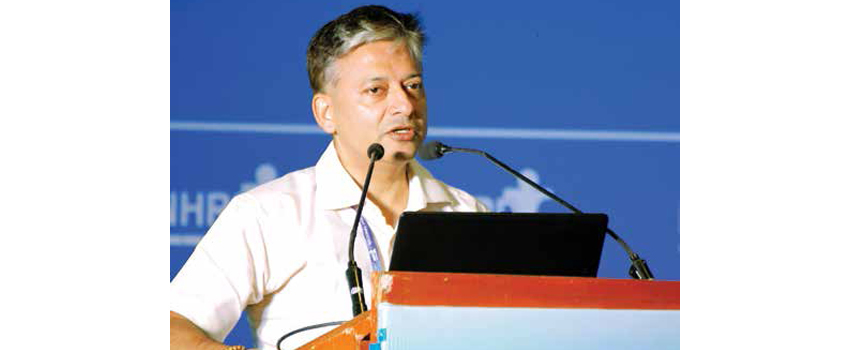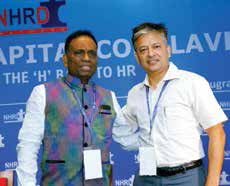THE MAGIC BLEND

The future of human resources is both digital and human and that is why many HR practitioners believe it’s the combination of artificial intelligence and human intelligence that will transform businesses and employees as we know it. HR veteran Biplob Banerjee, Chief People Officer at Allied Blenders & Distillers (ABD), explains why a new priority requires HR leaders to develop a knack for artificial intelligence while they re-imagine HR to be more intuitive and human
You worked for Jubilant FoodWorks Ltd as Executive President HR and CSR and other organizations such as GE Capital, Pepsico. How has your role evolved over the years?
Over the years it has become more intuitive, analytical and strategic in nature. Chief Human Resources Officers (CHRO) are now more than functional experts as they are seen as a strategic partner, culture leader, counsel to the CEO, analytics visionary, chief engagement officer.
Tell us about your early life, education and first job.
I was brought up in Kolkata and Jamshedpur and spent a lot of time in sports, with friends and very little on movies, eating out and travelling which my children indulge in these days.
I studied mechanical engineering at Jadavpur University and then did my MBA from XLRI Jamshedpur. My first job was as an engineer in a large steel plant where I worked in shifts. It was during my first job that I got the first taste of large size, complex operation, manufacturing process and its mindset, workmen and their challenges and how to resolve union issues apart from discipline and communication in the corporate world.
Did your academic degree prepare you for your career?
Yes, it did because it prepared me for technical, commercial, business and people management basics apart from understanding corporate values, ethics and people connect techniques and processes.
With a shrinking budget and staffing, how do HRs do more with less?
Evolving technology is helping us to do more with the right talent and cutting edge technology. Also, employees have become more productive. The millennia are extremely smart, talented and focused. Their problem-solving ability is making everything better, more convenient, faster, cheaper and user-friendly. Uber, Ola, Oyo, Paytm, BookMyShow, MakeMyTrip, net-banking, robots in medical operation, UPI, etc. are all proof of doing more with less due to the intelligent application of technology and understanding of human nature in a fast-changing world.
Why is a CHRO-CEO partnership important and what makes this partnership successful?
This is the most important relationship as together they craft the people agenda and how to translate the co-vision to execution through people process and culture. Both have to have respect and trust apart from huge self-awareness and humility. Many CEOs suffer ego and misplaced confidence, arrogance and dated pride. Many CHROs sit at ivory towers, show “know it all”, inflexibility to learn and unlearn apart from low biz acumen.
Do you think the most effective partnerships between CEOs and HR leaders happen when they align on a common vision and business strategy?
Yes, that’s the key. And the alignment here is through healthy debate, pushback, challenging each other. The maturity, openness, humility, listening and empathy play a key role to build this alignment.
"Evolving technology is helping us to do more with the right talent and cutting edge technology. Also, employees have become more productive"
What are the various HR issues which ABD has to immediately deal with, in order to have a productive workforce?
Hiring, retaining, developing and growing talent is the first roadblock. Also creating and preparing the organization and talent for the future is another area of HR contribution. Taking a well-balanced point of view and the ability to stick to one’s stance under pressure for the sake of the company is another area on any transformation journey.
How do you raise the bar for leadership talent across organizations?
This all starts with what is needed in future and how you prepare the talent pool is common in all the mega-brand companies I worked for, such as GE, Pepsico, Jubilant FoodWorks and ABD. Also, setting the people agenda, that’s well accepted and well contributed by all is what makes a difference and just not an HR agenda.
When you set out to recruit new talent, what do you look for? How do you retain star performers?
Learning agility and ambition. Ability to drive an agenda, deal with ambiguity and a lot of reference checks.
How can the HR department add value to the customer experience?
The best way is to start at the HR department itself and do a design thinking approach and redesign all internal customer interfaces with employees, vendors, board, and potential talent outside who are candidates.
Tell us about the latest trends in the HR industry. How are recruiters enhancing the quality of recruitment?
AI-based tools are leading this area. Video interviews, training hiring managers on quick adoption of technology and tools are other few trends apart from learning agility which is most important since many past experiences are getting irrelevant for future.
How do you leverage artificial intelligence analytics to recruit, retrain and reward?
First is to heavily adopt these across the organization and make it a day to day thing. Also, show the benefits in the next six to twelve months across the organization and how these are making a qualitative difference in the organizational level performance outcomes.
How can automation help HR managers? What are the five best HR tasks to automate to keep your organization up to date?

HR managers are inundated with manual processes. Many of these can be automated.
- Employee joining: Background verification, file creation, offer making
- Employee on boarding: Done through gamification, virtual reality
- Learning: Again AI and VR based programmes are there
- Appraisal: Through app-based goal setting, feedback, development plans are possible to automate
- Engagement: Many AI-based tools like Amber, are superefficient to understand employee satisfaction, wellness, engagement and predict and recommend real-time appropriate actions.
"Over the years role of HR has become more intuitive, analytical and strategic in nature. CHRO are now more than functional experts as they are seen as a strategic partner, culture leader, counsel to the CEO, analytics visionary, chief, engagement officer"
Do you think automation will lead to a declining number of generalist employees responsible for mundane repetitive transactional tasks, including HR generalists?
Yes, it’s already started. But may take time because it takes time to remove employees and set processes in a new paradigm.
With emerging technologies such as AI augmenting human capabilities and increasing business value in unforeseen ways, do you think the age of the intuitive HR leader is gone?
To the contrary, more intuitive perspective will shape and stand out in the success of the organization and all of which will influence teach and vice versa.
Tell us about the corporate culture at ABD and how is it different from your previous organizations?
From being a single brand company a little over eight years ago, today ABD is a multi-brand company having a presence in almost all categories within the spirits industry. We have been the highest-selling whisky brand in the world dominated by MNCs. So the culture is to keep gaining share, in a profitable way. So customer obsession, teamwork, innovation, pride, professional integrity, are how we work daily.
The degree to which employees are “engaged” has a direct impact on profitability. How do you keep your workforce engaged?
Challenging work, career path understanding and development, recognition, personal touch and care are some of the things we do to keep employees engaged. One critical distinction is long term career path and many such live examples are there in ABD. There are people who have worked with our Chairman for many years and they share their stories during induction and few are working past their retirement age. It’s a unique philosophy and working for us as a magic blend.
What are your best HR policies that you use to keep your employees engaged?
Mentioned as above. It is a magic blend.
What kind of employee engagement activities do you use?
A lot of time is spent with senior leaders and direct feedback on how to become a better leader. Attention on all key players irrespective of level or function. We take care of our employees beyond the call of duty.
You have headed CSR at Jubilant Food- Works, do you think CSR can drive employee engagement and build strong internal teams?
Yes, especially the millennia who get more engaged as they find a bigger purpose and get self-fulfillment.
Do employees respond positively when you engage in societal issues?
Yes, 100%, but the degree varies on the type of causes and how it is brought and presented to employees.
What challenges and obstacles do you see human resources management facing in the future?
Plenty: challenges are better judgment, better solution framing, more diversity inclusivity, retaining talent. Obstacles are ego, rigidity, arrogance, misplaced and dated pride, inability to develop leaders, belief in old theories of management etc.